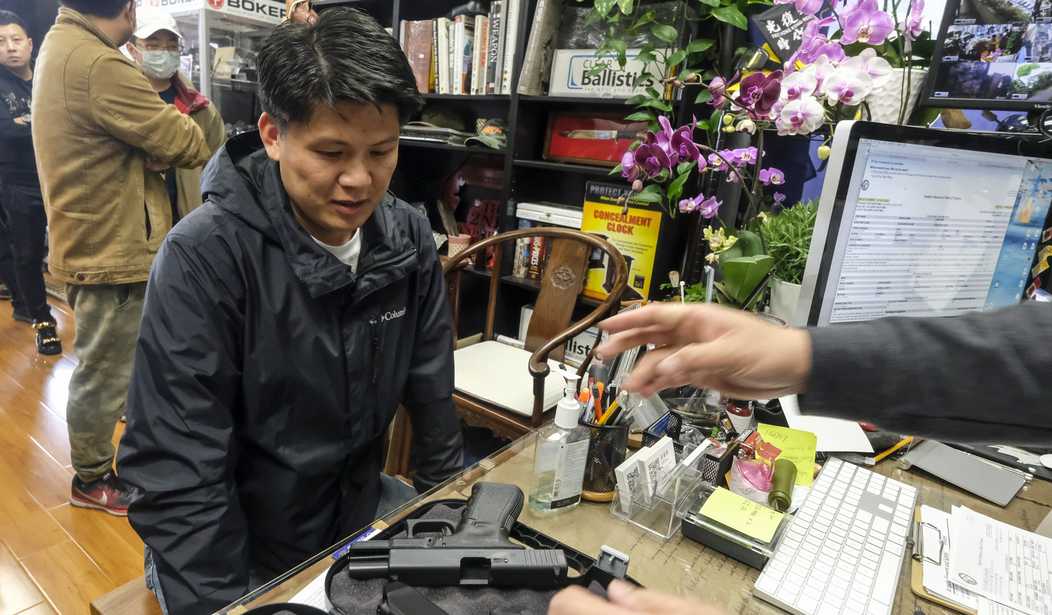Massachusetts Gov. (and Kamala Harris campaign surrogate) Maura Healey may claim to be a champion of democracy, but her belated move to attach an emergency preamble to the state's latest gun control law is nothing more than an attempt to subvert the will of the people. Healey's "emergency" has nothing to do with a sharp increase in violent crime. Instead, it's meant to curtail the efforts to suspend enforcement of the law until voters can decide in 2026 whether the law should remain in place.
"...Healey said she decided to approve emergency language for the gun law two months after she signed it into law because 'this is just when we were able to process it and look through it, review the legislation.'" https://t.co/pwZwFJgVT7
— Firearms Policy Coalition (@gunpolicy) October 2, 2024
That's not even a good lie, but let's assume for the sake of argument that it's true. If it took state officials two months to figure out what's in the new law, then how on earth are gun owners and other stakeholders supposed to know all of the details that will now be fully enforced? Healey's statement is an argument in favor of delaying implementation, not moving up the effective date of most of Chapter 135's new restrictions.
Toby Leary, chair of the grassroots group that's been collecting signatures to put Chapter 135 before the voters, says the Civil Rights Coalition has more than enough signatures to qualify for the ballot and to suspend the law until a referendum is held, but under a quirk in Massachusetts law those efforts can be stymied by the governor with a stroke of her pen. But as Mike Harris of the Gun Owners Action League tells Bearing Arms on today's Cam & Co, the emergency preamble means the new law takes effect immediately after she puts pen to paper, and that means gun owners, gun sellers, and even law enforcement are in the dark about the numerous changes to state statute.
"If our team hasn't been able to figure out all the details, God forbid the average citizen gets stopped by a police officer somewhere," Harris said today.
A lot of it comes down to interpretation. We have our analysis and summary of what this actually means, but looking at the black letter of the statute can sometimes be very different than the interpretation from the executive branch, who are charged with enforcing this stuff.
The law says one thing, and we try to interpret it as conservatively as possible to help keep our members out of jail, but the new Attorney General is very unfriendly to guns, the new state police colonel who is the author of all the enforcement regulations in New Jersey, are the ones who are in charge of setting forth and promulgating the regulations that are associated with the statute. So it's all the minutia that's going to make a difference. So, for example, depending on how the Executive Office of Safety and Security and that secretary interprets the new roster provisions, we might have nothing for sale at gun shops come tomorrow.
Previously, Massachusetts defined a "firearm" only as a pistol or handgun. Now, the definition includes all long guns as well, which means before they can legally be sold under Chapter 135 they must be independently tested and certified for sale by the Massachusetts State Police, or added to the roster by the secretary of the Executive Office of Safety and Security. Harris says it's possible that the EOSS will simply scrap the existing roster, which includes only handguns, and start to build a new roster that contains some rifles and shotguns as well. But while that new roster is being created, what happens to gun sales? The letter of the law requires that only firearms on the state's roster be available for sale. At the very least, Healey's move could put a halt to sales of long guns for an indefinite period of time, but as Harris suggests, the state could conceivably try to stop all gun sales from taking place.
There are also new requirements for common carriers like UPS and FedEx when it comes to transporting firearms and ammunition, which could wreak havoc on the ability of FFL's like Leary to bring in new inventory that is on the state's firearm roster. Those common carriers are now required to store arms and ammo in a locked container, and it's unclear whether the storage compartment of their trucks and semi's meet the new standard.
Another issue comes from the state's attempt to crack down on home-built firearms. Harris says owners of unserialized firearms are now required to obtain a serial number from the state, even though Massachusetts has yet to come up with a system that allows them to get one. How exactly are gun owners supposed to comply with that law? Neither Healey nor Attorney General Andrea Campbell has offered any guidance to gun owners.
In fact, the training for retailers and lawmakers on how to comply and enforce all of Chapter 135's new edicts was recently pushed back 18 months by the state legislature, but the edicts themselves will be enforceable once the emergency preamble has been attached.
Chapter 135 was already a slow-moving train wreck, but Healey's move to circumvent the suspension of the law has accelerated the confusion, chaos, and legal jeopardy gun owners, gun sellers, and law enforcement now face. Most Massachusetts gun owners have no idea of all of the new restrictions they're supposed to follow, but that won't stop prosecutors from charging them with violating the law going forward.
Be sure to check out the entire conversation with GOAL's Mike Harris in the video window below, and tune in to Cam & Co tomorrow as well for more information and updates on The Devil's Snare and its irreparable harms to the right to keep and bear arms.









Join the conversation as a VIP Member